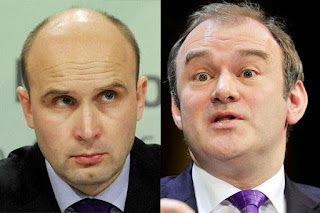
Ed Davey and his progressive colleagues in four other Western European governments are set to clash with their eastern European counterpart in Poland at today's vital meeting of the European Environment Council.
The U.K.'s Energy and Climate Change Secretary, attending his first such meeting in his new role, is backing a move to increase Europe's 2020 target for greenhouse gas emissions cuts from the current 20% to 25%.
This is less ambitious than his predecessor, Chris Huhne, who supported a target of 30% cuts by 2020.
Huhne had argued that this target was less expensive than many thought and that it would save money in the medium and longer term.
The Energy 2050 Roadmap
The EU is already on track to meet its binding goal of lowering CO2 emissions by 20% by 2020. Increasing it to 25% or even 30% is not considered overly onerous.
According to the Energy 2050 Roadmap published by the European Commission last year, without tougher targets the European Union risks locking in carbon-intensive generation plants for the foreseeable future.
The Roadmap seeks cuts in emissions of 95% by 2050 relative to 1990.
On the other side of the desk from Davey today will sit Polish Environment Minister Marcin Korolec.
Korolec will say that the only way Poland will sign up to an increase in the target is if it is granted free allowances for all of its 16 coal powered electricity generating plants under the Emissions Trading Scheme. Poland produces over 90 percent of its electricity using coal.
This risks undermining the whole European emissions-reduction project and is opposed by virtually all the other 26 member states.
Industry misinformation
Behind Poland's position is a campaign of industry misinformation from the Polish energy lobby including the Polish Chamber of Commerce (Krajowa Izba Gospodarcza), and the biggest Polish energy companies Tauron Polska Energia S.A. and PGE (Polska Grupa Energetyczna) S.A., that has been exposed by Polish energy campaigner Kuba Gogolewski amongst others.For example, the Chamber of Commerce recently published a report which claimed that the costs of implementing the EU climate and energy package would cost Polish industry zł.22 billion a year from 2030; that's four times higher than estimations made by the World Bank and the European Commission (pdf).
However, as pointed out by a coalition of 22 Polish environmental groups, the report leaves out many factors, such as the external costs to Polish society of industrial energy production worth €10-19 billion a year, costs of coal subsidies (€650 million in 2010), and the €1.5 billion per year imports of coal, that emit 15 million tonnes of CO2, thereby grossly understating the baseline scenario against which the costs of the EU package are compared.
Gogolewski writes on his blog that “the dominant position of coal companies in Polish society weakens public debate, ensures that information about alternatives to coal fails to reach the general public, and thus prevents the country from developing a green economy with new jobs and opportunities".
He also points out that Poles are paying for this coal dependency with their lives: “pollution coming from coal lowers the life expectancy of the average Polish citizen by at least eight months, according to estimates by the World Health Organisation for the year 2000".
Today's meeting of environment ministers
Today's meeting is led by Danish Climate and Energy Minister Martin Lidegaard, who has called for a show of unity. “I think it will be a serious situation for Europe if we, for the second time, are not able to agree on climate policy which can send a clear signal to our industry, citizens and also to the rest of the world,” he said.Senior Polish politicians in Brussels have questioned whether emissions from coal cause global warming at all. “What I think is worrying is if we are now seeing certain member states question the science behind [climate change], the fundamental values and objectives that have been in the treaty for a very long time and if that’s the case, its for the highest level to discuss,” a Danish presidency source said yesterday.
In Germany, despite having the highest electricity prices in Europe, energy bills are lower than in the UK, because of the emphasis on domestic energy efficiency, Greg Barker pointed out in the House of Commons yesterday, as he and Davey set out the Coalition Government's energy policy.
Besides the Roadmap, the other items on the agenda today include setting European positions on the follow-up to the Durban climate conference, and the EU negotiating position for the UN Rio+20 conference on sustainable development to be held in Brazil in June.
Ministers will also discuss the restriction or prohibition of the cultivation of genetically modified organisms in Europe, and a proposal for a new regulation on LIFE, which provides funds for climate action and the environment.
€3.2 billion of grant funding
The overall budget for the new LIFE programme would be raised to €3.2 billion, of which €800 million would be allocated to a new climate sub-programme, which will focus on reducing greenhouse gas emissions, increasing resilience to climate change, and increasing awareness, communication, and exchange of information on climate actions.€2.4 billion will be targeted at promoting resource-efficiency, using innovative solutions for better implementation of environment policy and integration of environmental objectives in other sectors.
Regarding Rio, ministers will discuss proposals for the establishment of Sustainable Development Goals and their level of ambition.
On GMO cultivation, Britain will argue for individual member states to be able to decide their own policy on the issue.
They will also be discussing resource efficiency and low carbon growth, issuing a call for rapid progress on the implementation of the Roadmap to a resource-efficient Europe and the mainstreaming of environmental and climate related issues into the economic agenda for growth and jobs.